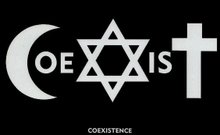Blessed are the Peacemakers, For They Shall Be Called... Liberal Hippies?
"You're a liberal hippie that endorses the anti-christ"--yelled at me by some random college student enraged by the very sight of my shirt with the logo seen below.

I've received several comments about this logo, implying that it's blasphemous, anti-christian, and endorses a one world order. So, I just wanted to set the record straight concerning this logo: what it really means and why coexistence is something Christians shouldn't fear, but should actively work towards.
Let's start with the definition of the word "Coexist"
"To exist together, at the same time, or in the same place.
To live in peace with another or others despite differences" (Webster Dictionary).
Here's what COEXIST does NOT mean: to merge beliefs and ideas, to compromise or sacrifice one's own beliefs to achieve peace, to abandon dialogue about accountability, challenges, hypocrisies, persuasion, or conversion, and it definitely does NOT mean for all people to embrace a unified belief system to establish a ONE WORLD ORDER. In fact, coexist means the opposite of a one world order, because a one world order would contain no diversity at all. People would all live under the same form of government, religion, and culture. There would be no diversity or differences to coexist with! Coexistence implies existing amongst inherent differences that firmly remain.
Usually the word "coexist" is a far cry from the harmonious unification of all mankind singing Peace on Earth while sharing a Coca-Cola. For example, if a spouse describes their marriage as "coexisting with each other," that implies that they are not intimately intertwined or unified. It means their just not at war with each other at the moment. However, the current relationship between certain countries, religions, and political affiliations are so dire, that coexistence would be a step up.
The idea behind this logo is one that most Christians already know and do. The acknowledgement of God's gift of life to all human beings and the right to preserve that life until God deems otherwise is endorsing coexistence. Conceding that people possessing different religions, political beliefs, and social orders have the right to exist on the same planet until God deems otherwise is coexistence. Functioning in the same society with nonbelievers is practicing coexistence. To renounce coexistence would be to endorse the oppression, coercion, and execution of anyone who refuses to convert to Christianity (which is a horrifying "Hitleresque" notion). So, it is not such a radical notion for a Christian. Romans 12:18 commands us to live in peace with all men when it is possible. What does that mean? Just people that believe, think, and look like us? No, it means what it says, ALL men. That includes Muslims, Hindus, Jews, atheists, gays, etc. etc.
It's apparent that many Christians get freaked out when they hear people talking about living in peace because they assume that living in peace will automatically result in a one world order. That is only true if rejecting God and sacrificing our individual freedom to BE DIFFERENT from each other is the condition of peace. Allowing differences and living in peace DESPITE the differences actually prolongs a one world order. Once the world gets so irreversibly out of control with wars, violence, and atrocities because of conflicting religious and political beliefs, that will be when a leader will rise to power to stamp out all such differences in the name of restoring peace.
Forget even END TIMES stuff for the moment. Coexistence is the foreground for effective communication, which can lead to conversion. Isolation from and mud-slinging against those who differ from us Christians only widens the gap of true communication and the accurate depiction of the gospel. People's hearts will only be has hard as the stones we throw at them. Showing people the same respect that we want: to hold and practice our beliefs freely is coexistence and a vital part of demonstrating our faith. Coexisting works in conjunction with loving our neighbor as ourselves and doing unto others as we would have them do to us. It's striving to live in peace with all men as Paul instructs.
So, next time you see me with my "controversial" shirt, know that I wear it because I believed Jesus when he said, "Blessed are the peacemakers," no matter what they end up being called.






















